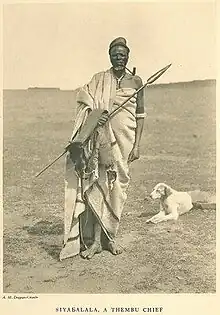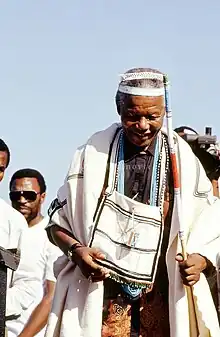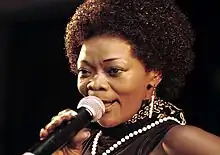Thembu Kingdom
The Thembu (Xhosa: AbaThembu) are Xhosa people who were living in the Thembu Kingdom.
 Siyaɓalala, chief of the Ndungwana clan of the Thembu, c. 1930s | |
| Total population | |
|---|---|
| 3.3 million | |
| Regions with significant populations | |
| Languages | |
| IsiXhosa | |
| Religion | |
| Christianity, African Traditional Religion | |
| Related ethnic groups | |
| Xhosa, Mpondo, Swati, Zulu |
| The Thembu/Tamboekie people | |
|---|---|
| Person | UmThembu |
| People | AbaThembu |
| Language | IsiXhosa |
| Country | Thembuland region in the Xhosa Kingdom |


According to Xhosa oral tradition, the Thembu migrated along the east coast of southern Africa before settling in KwaZulu-Natal. The earliest known Thembu ancestor is Mbulali, whose grandson (named Thembu), led his people from what became the South African province of KwaZulu-Natal to Dedesi in the present-day Transkei region of South Africa. The Thembu emerged as a unified people during the reign of Ngxeko/Nxekwa, who united clans living in Thembuland into a single political entity, owing allegiance to the Thembu royal family, or "Hala Mvelase." Famous Thembus include Nelson Mandela, whose father was a reigning nobleman from a junior branch of the Madiba clan of kings, and Walter Sisulu.[1]
Name
In Xhosa, the name is abaThembu, (aba- is a common prefix implying "people").[2] The territory of the Thembu state was historically known as Thembuland.
In the 19th century, Thembu were frequently known as the "Tamboekie" or "Tambookie" people. This name was originally the Khoisan language term specifically for the followers of Chief Maphasa who moved into the area west of the Great Kei River in the 1820s. However, Europeans used these terms as a synonym for "Thembu" for much of the 19th century.
History
Prior to the British conquest in the 19th century, the Thembu had an independent kingdom. The Xhosa clan name of the Thembu kings is Ntlazi aNkosiyane.[3] Recent kings, including Sabata Jonguhlanga Dalindyebo, took the surname Dalindyebo, after a 19th-century king.
After the conquest, the Thembu came under the government of the Cape Colony as part of Transkei. Except for a few missionaries and traders, Transkei was a Bantustan. The Transkei remained a Bantustan under apartheid and was along with Ciskei regarded as the homeland of the Xhosa people.
King
Buyelekhaya Dalindyebo, son of Sabata Jonguhlanga Dalindyebo, became the Thembu king in May 1989; his praise name is Zwelibanzi. Sabata deposed Kaiser Matanzima, whom the government had installed and who advocated against South African liberation movements. In December 2009, King Buyelekhaya was convicted of offenses including culpable homicide, kidnapping, arson and assault. In response, he proposed secession from South Africa,[4][5] and later demanded that the government pay Dalindyebo R900 million and the tribe a further R80 billion in compensation for the humiliation caused by his criminal trial.[6]
Dalindyebo was imprisoned in December 2015. He was customarily dethroned and was expected to be administratively dethroned.[7]
Prince Azenathi Dalindyebo, Buyelekhaya's heir, has served as the acting king of the tribe since 2016.
On 23 December 2019, following president Cyril Ramaphosa's Day of reconciliation speech, the abaThembu king was released from prison after serving one-third of his sentence.
Lineage
- Ndala
- 1800 - 10 Aug 1830 Vusani Ngubengcuka Aa! Ndaba!
- Mthikrakra
- Ngangelizwe
- Dalindyebo
- Sampu Dalindyebo Aa! Jongilizwe!
- Sabata Dalindyebo Aa! Jonguhlanga!
- May 1989 - present Buyelekhaya Dalindyebo Aa! Zwelibanzi!
Thembu Kingship line
| Thembu | |||||||||||||||||||||||||||||||||||||||||||||||||||||||||||||||||||||||||||||||||||||||||||||||||||||||||||||||
| Ndilo | |||||||||||||||||||||||||||||||||||||||||||||||||||||||||||||||||||||||||||||||||||||||||||||||||||||||||||||||
| Ntongakazi | |||||||||||||||||||||||||||||||||||||||||||||||||||||||||||||||||||||||||||||||||||||||||||||||||||||||||||||||
| Bhomoyi | |||||||||||||||||||||||||||||||||||||||||||||||||||||||||||||||||||||||||||||||||||||||||||||||||||||||||||||||
| Ceduma | |||||||||||||||||||||||||||||||||||||||||||||||||||||||||||||||||||||||||||||||||||||||||||||||||||||||||||||||
| Zima | |||||||||||||||||||||||||||||||||||||||||||||||||||||||||||||||||||||||||||||||||||||||||||||||||||||||||||||||
| Mnguti | |||||||||||||||||||||||||||||||||||||||||||||||||||||||||||||||||||||||||||||||||||||||||||||||||||||||||||||||
| Ngxongo | |||||||||||||||||||||||||||||||||||||||||||||||||||||||||||||||||||||||||||||||||||||||||||||||||||||||||||||||
| Ntoyi | |||||||||||||||||||||||||||||||||||||||||||||||||||||||||||||||||||||||||||||||||||||||||||||||||||||||||||||||
| Ntande | |||||||||||||||||||||||||||||||||||||||||||||||||||||||||||||||||||||||||||||||||||||||||||||||||||||||||||||||
| Ndungwane (AmaNdungwane) | Nxeko | Hlanga (AmaQhayi) | |||||||||||||||||||||||||||||||||||||||||||||||||||||||||||||||||||||||||||||||||||||||||||||||||||||||||||||
| Dlomo | |||||||||||||||||||||||||||||||||||||||||||||||||||||||||||||||||||||||||||||||||||||||||||||||||||||||||||||||
| Hala | |||||||||||||||||||||||||||||||||||||||||||||||||||||||||||||||||||||||||||||||||||||||||||||||||||||||||||||||
| Madiba | |||||||||||||||||||||||||||||||||||||||||||||||||||||||||||||||||||||||||||||||||||||||||||||||||||||||||||||||
| Tato | |||||||||||||||||||||||||||||||||||||||||||||||||||||||||||||||||||||||||||||||||||||||||||||||||||||||||||||||
| Zondwa (he never became a King because he died before his father) | |||||||||||||||||||||||||||||||||||||||||||||||||||||||||||||||||||||||||||||||||||||||||||||||||||||||||||||||
| Ndala | |||||||||||||||||||||||||||||||||||||||||||||||||||||||||||||||||||||||||||||||||||||||||||||||||||||||||||||||
| 1800 -10 August 1830 Vusani Ngubengcuka Aa! Ndaba! | |||||||||||||||||||||||||||||||||||||||||||||||||||||||||||||||||||||||||||||||||||||||||||||||||||||||||||||||
| Mthikrakra | Mandela (chief) | ||||||||||||||||||||||||||||||||||||||||||||||||||||||||||||||||||||||||||||||||||||||||||||||||||||||||||||||
| Ngangelizwe (Qheya) | Henry Gadla Mphakanyiswa Mandela Aa! Gadla! | ||||||||||||||||||||||||||||||||||||||||||||||||||||||||||||||||||||||||||||||||||||||||||||||||||||||||||||||
| Dalindyebo (Alava) | Matanzima | Nelson Rolihlahla Mandela Aa! Dalibhunga! | |||||||||||||||||||||||||||||||||||||||||||||||||||||||||||||||||||||||||||||||||||||||||||||||||||||||||||||
| Sampu Dalindyebo Aa! Jongilizwe! | Kaiser Matanzima Aa! Daliwonga! | George Matanzima Aa! Mzimvubu! | Madiba "Thembi" Thembekile Mandela [1945–1969] | Makgatho Mandela [1950–2005] | |||||||||||||||||||||||||||||||||||||||||||||||||||||||||||||||||||||||||||||||||||||||||||||||||||||||||||
| Sabata Dalindyebo Aa! Jonguhlanga! | Mthethuvumile Matanzima (he never became a King because he died before his father) | Mandla Mandela Aa! Zwelivelile! | |||||||||||||||||||||||||||||||||||||||||||||||||||||||||||||||||||||||||||||||||||||||||||||||||||||||||||||
| May 1989 - Buyelekhaya Dalindyebo Aa! Zwelibanzi! | Lwandile Zwelenkosi Matanzima Aa! Zwelenkosi! | Siyambonga Dalimvula Matanzima Aa! Dalimvula! | |||||||||||||||||||||||||||||||||||||||||||||||||||||||||||||||||||||||||||||||||||||||||||||||||||||||||||||
See also
References
- Walter Sisulu Archived 2012-06-16 at the Wayback Machine Ancestry24
- Oosthuysen, JC (14 Sep 2016). The grammar of isiXhosa (First ed.). Matieland, South Africa: African Sun Media. p. 25. ISBN 9781928357070.
- mxhosa. "AbaThembu". Iziduko. Retrieved 2020-05-27.
- "Troubled monarch sentenced to 15 years". www.iol.co.za. Retrieved 2021-10-21.
- "Convicted king plans independent state". www.iol.co.za. Retrieved 2021-10-21.
- Tribe suspends secession plans News24
-
Compare: "Intrigue in the royal household as King Buyelekhaya Dalindyebo sits in jail". Times Live. 1 January 2016. Retrieved 2016-11-01.
In terms of laws governing traditional authorities, he also had to be administratively dethroned. This involved President Jacob Zuma withdrawing the certificate that recognized him as a king and cutting off the benefits that went with his status. [...] Mtirara said Zuma gave Dalindyebo a chance to say something when the certificate was about to be withdrawn, but he chose to go to court instead. This meant the matter of withdrawing the king's certificate still had to be dealt with.
External links
- Sihele, E. G., Who are abaThembu and Where Do They Come From? (PDF) (manuscript), translated by Tisani, N. C., retrieved 2023-09-12 – via Rhodes University
- Royal lineage at worldstatesmen.org